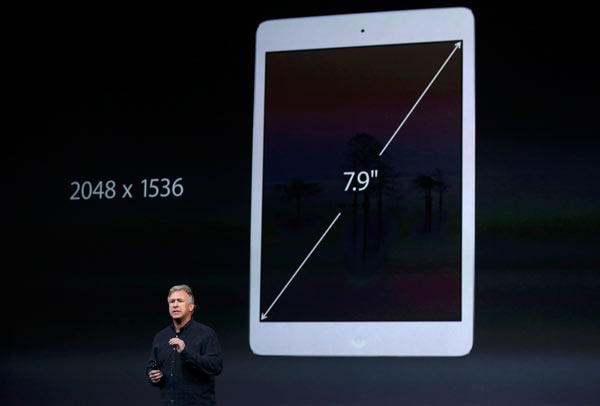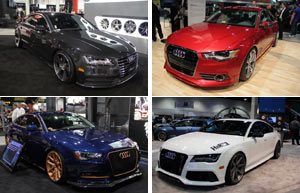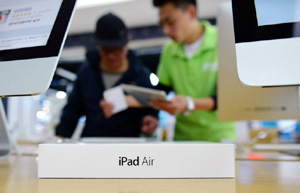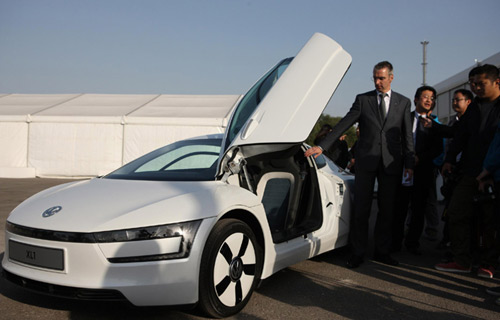Apple's new iPads get serious upgrades
Updated: 2013-10-23 08:56
 |
|
Philip W. Schiller, Senior Vice President of worldwide marketing at Apple Inc, introduces the new iPad mini with retina display during an Apple event in San Francisco, California October 22, 2013. [Photo/Agencies] |
Not that Apple would ever admit it, but the new line of iPads launched today are responding to some key challenges that have emerged as the tablet market has grown more crowded and fierce.
New research from Gartner shows that tablet shipments are expected to jump 53 percent this year, compared to 2012. Apple can no longer take for granted its initial dominance in this fast-growing and increasingly diverse market. Consumers want choices which may explain why in September Android tablets collectively overtook iPads as the most popular type of tablet.
Today Apple unveiled the new iPad Air: a thinner, lighter full-size tablet. Apple also announced upgrades to the iPad Mini.
Here's a look at some of the new features and what they mean for consumers.
Weight: One of the main criticisms of full-size (10-inch) tablets has been their weight. So lighter is probably the biggest benefit of the iPad Air. This device weighs just one pound, down from 1.4 pounds for the iPad 2. For a device that you'd likely hold in your hands for significant chunks of time (reading books, watching videos, video calling, etc.) the decreased weight would make it less tiring to hold your iPad longer -- something users are likely to value.
Meanwhile, most other 10-inch tablets still weigh in at around 1.3 to 1.4 pounds. The newly released Microsoft Surface 2 weighs in at more than 2 pounds, not even including its much-touted snap-on keyboard accessory. Microsoft doesn't even list weight under the specs for the Surface 2, it's probably not something they'd want to highlight.
Performance: In tablets, performance has been a weak spot. Tablet users often complain about how these devices are generally slower to render images, open files, etc. compared to desktop or laptop computers.
All new Apple mobile products launched today, including the iPad Air, offer faster performance thanks to Apple's new A7 64-bit processor -- which debuted earlier this year with the iPhone 5S, and has been getting positive reviews. They also all feature MIMO Wi-Fi, which offers faster data throughput (up to 300 mbps), and a Retina display (now also on the new iPad Mini). These hardware features should make the new Apple mobile devices feel noticeably snappier and more responsive than many competing devices.
Cost: This has gotten to be a key market pressure for tablets. Apple has always been able to sell their products at a substantial price premium, but they appear to be less ambitious in terms of pricing for the iPad Air.
The iPad Air should be available in retail stores November 1. Prices for the iPad Air start at $499 for Wi-Fi only ($629 Wi-Fi+cellular, including LTE on some carriers), making it the highest-end iPad offering. If that's too pricey, Apple is continuing to sell the full-size iPad 2, and it has dropped its price as it now starts at $399 for Wi-Fi and $529 for Wi-Fi+3G.
This means the iPad Air isn't hugely more expensive than Google's Nexus 10 tablet (Wi-Fi only, starts at $399), and it's also less pricey than the Samsung Galaxy Note 10.1- 2014 Edition, which starts at $529 for Wi-Fi only. So, quietly, Apple's mobile products are easing off on the premium pricing.
For the first couple of years after the debut of the first iPad, Apple contended that the 10-inch tablets were what consumers wanted. So the company didn't debut the 7-inch iPad Mini until last year, well after several other 7-inch tablets had hit the market (including the unexpectedly popular, though lower-performing, Kindle Fire tablets from Amazon). But new research from Gartner shows that smaller tablets are highly popular: 47 percent of consumers surveyed own a tablet that's 8 inches or less.
One of the main attractions of smaller tablets, aside from how they're more portable, is the smaller price tag. The new iPad Mini with a 7.9-inch Retina display, which will be available later in November, starts at $399 for Wi-Fi ($529 for Wi-Fi plus cellular, including LTE on some carriers).
Apple also will continue to sell the original iPad Mini (no Retina display), and it has dropped the starting price to $299 (down from $329). This puts an iPad Mini in at roughly comparable price range to the new 7-inch Kindle Fire HDX, which starts at $229, but for that extra $70, iPad Mini users get markedly superior features, performance and battery life.























